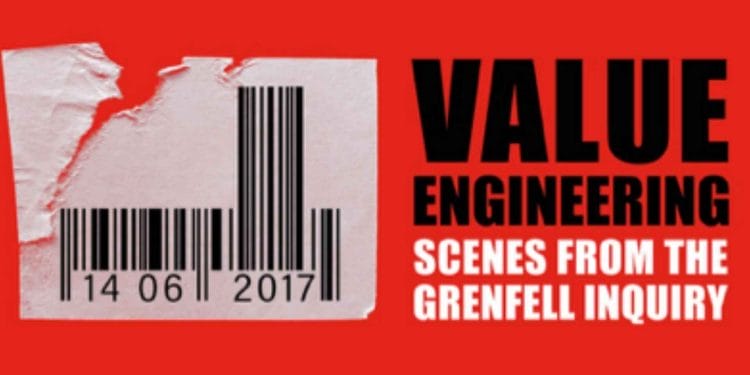Grenfell: Value Engineering – Scenes From The Inquiry sets out to discover why the devastating fire of 14 June 2017 happened after the refurbishment of Grenfell Tower, and who was responsible for the deaths of 72 people.
The dramatic evidence, based entirely on the words of those involved in the current Grenfell Tower Inquiry, is brought to the stage by the creative team responsible for the dramatisation of The Colour of Justice – The Stephen Lawrence Inquiry at the Tricycle Theatre, the National Theatre, in the West End and on BBC TV, and the Olivier Award-winning Saville Inquiry play Bloody Sunday.
The not-for-profit production of Grenfell: Value Engineering – Scenes From The Inquiry is running from 13 October – 13 November at the recently renovated Tabernacle in Notting Hill and at Birmingham Rep from 16 – 20 November. The play is edited by Richard Norton-Taylor and directed by Nicolas Kent, with casting by Amy Ball at CDG.
Richard Norton-Taylor said: “Grenfell Tower, engulfed in flames in less than half an hour in the deadliest fire in a residential building since the Blitz, the worst loss of life in a single incident in London for more than 60 years, was still smouldering when survivors and families of the bereaved demanded a wide-ranging public inquiry into a disaster they had warned was waiting to happen. Their concerns about the risks of fire and obstacles in the way of evacuating the 24-storey building were dismissed by officials in the Royal Borough of Kensington and Chelsea, one of the richest local authorities in Britain.
The inquiry, under a former appeal court judge who is unlikely to report his conclusions before well into next year, has said the principal reason why the fire spread so rapidly was the decision to wrap the tower in extremely flammable material in its recent refurbishment. The inquiry exposed what lay behind the decision that led to the fatal conflagration, what a lawyer for the survivors and bereaved described as “a chronic culture of neglect, of indifference and discrimination underpinned by a theme of dishonesty”, and another called an “epidemic level of incompetence”.
What has emerged from the inquiry is an extraordinary catalogue of greed, fraud, cheating and lying, secret fixing of fire tests on their products, subtle layers of corruption and racism, fatal cost-cutting, casual indifference, and practices which one young company executive called “completely unethical” and which some even joked about. It exposed fatal consequences of austerity and deregulation. The switch to cheaper, more combustible, material saved less than £300,000 on the £10m refurbishment. The cost was 72 lives and hundreds of bereaved relatives and friends. The cost to tenants and mortgage holders living in over 250 residential blocks clad with similar dangerous cladding – and to taxpayers – will amount to many hundreds of millions of pounds.
The evidence in the Grenfell Inquiry reflects many of the problems deeply embedded in contemporary British society. I believe that presenting it to a theatre audience will lead to a wider understanding of the story behind a fire whose repercussions will be felt for many years.”
The Grenfell Inquiry is one of the most important public inquiries of the past two decades. It is a powerful example of the investigatory reach of the law and its ability to call people to account. It is of profound importance to the survivors of the tragedy and their families. The tragedy has also left an estimated 700,000 people still trapped in dangerous homes and has revealed hazardous construction problems going back many years that are now preventing three million others from selling their flats. The inquiry’s work has huge repercussions for present policy and better future regulation for millions of people living in social or private housing in the UK.
The inquiry has now been running for four years. This edited verbatim account of the inquiry is aimed at giving the public a clearer overview and access to the evidence.
Alongside the production The Playground Theatre is providing an important education programme. The programme, VALUED, will be available to local schools and the local community. It aims to provide schools with information about the production alongside the contemporary issues of importance that it addresses and the key links to the national curriculum and wider understanding of communities, social justice and human rights.
Major supporters of Grenfell: Value Engineering – Scenes From The Inquiry are the Paul Hamlyn Foundation, the Joseph Rowntree Charitable Trust and Nimax Theatres.

















